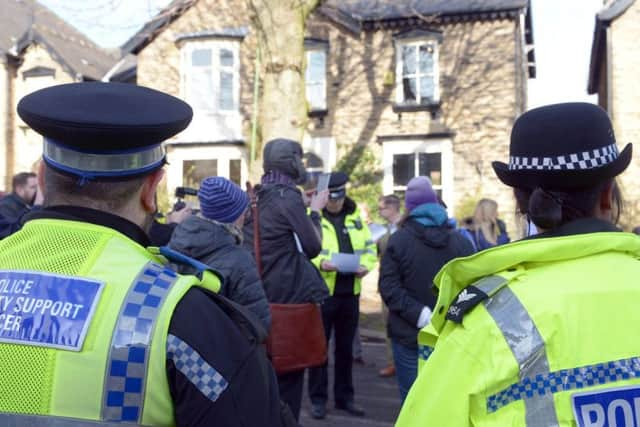Police had '˜no grounds' to use trade union laws to arrest Sheffield tree protesters
The Independent Office for Police Conduct has upheld appeals from six complainants relating to arrests made in connection with tree-felling work in the city under the Trade Union and Labour Relations Act between November 2016 and February 2017.
Protesters who oppose a major tree-felling programme in the city had employed a tactic of standing directly under threatened trees to prevent their removal by council contractors. Between late 2016 and early 2017, 14 people were arrested for preventing lawful work under the rarely-used section 241 of the Trade Union and Labour Relations Act 1992. In March 2017 after the CPS dropped cases, police commissioner Alan Billings said there was “no mileage” in the force making arrests under the legislation, which is normally used in relation to workers on picket lines during strikes.
Advertisement
Hide AdAdvertisement
Hide AdSheffield Council subsequently successfully applied for a High Court injunction making such ‘direct action’ protests involving standing underneath threatened trees an offence.


A spokesman for the IOPC said: “South Yorkshire Police investigated complaints about arrests they made during a number of incidents that took place in Sheffield, between November 2016 and February 2017. Following the police’s investigation we received six appeals from complainants who were not satisfied with the force’s investigation findings.
“After reviewing the police’s investigation, we upheld the complaints in relation to the grounds on which the arrests were made. Though we found there was reasonable suspicion that an offence had been committed, the protesters were arrested for the prevention of harm and injury; there were no grounds for this as there was no risk of injury. We have recommended management action for the three officers who made the arrests.”
Jeremy Peace, one of the complainants, said: “In my view the police were determined to support the interest of the tree-fellers over the right of peaceful protesters. I am pleased my complaint has been upheld and hope South Yorkshire Police can learn from this episode.”
Advertisement
Hide AdAdvertisement
Hide AdHowells Solicitors, which represented five of the six complainants, said all of its clients were charged but had criminal cases against them discontinued following a review by the Crown Prosecution Service.
Iftikhar Manzoor from Howells Solicitors said: “My clients were lawfully exercising their rights to protest against the tree-felling programme and passionately believe that they were acting peacefully at all times. They were rightly concerned about the actions of some South Yorkshire Police officers in arresting and detaining them, which the IOPC decision vindicates.”
A spokeswoman for South Yorkshire Police said: “South Yorkshire Police notes the Independent Office for Police Conduct’s response in relation to the arrests made in relation to protests in Sheffield. It is important to understand the IOPC did not question the officers’ motivation for the arrests, but questioned whether they were appropriate.
“No officers were found to have a case to answer for misconduct.
Advertisement
Hide AdAdvertisement
Hide Ad“These findings underline the complexity our officers face in dealing with competing interests, where they often have only a split second to make decisions, which are then examined at length for weeks or months, not just in terms of their legality but also around wider issues of context.
“We will be discussing with the IOPC their interpretation and relevance of the term ‘appropriate’ as it is not one that features in the relevant legislation or case law.
“We will of course consider the recommendations made, as we recognise the continual need to seek to develop our approach in a challenging area of policing.”
Tree-felling work in the city has been on hold since March following a national outcry at the use of dozens of police officers and private security guards to support operations in the wake of growing protests. Sheffield Council and contractor Amey are reviewing the way in which work is carried out.